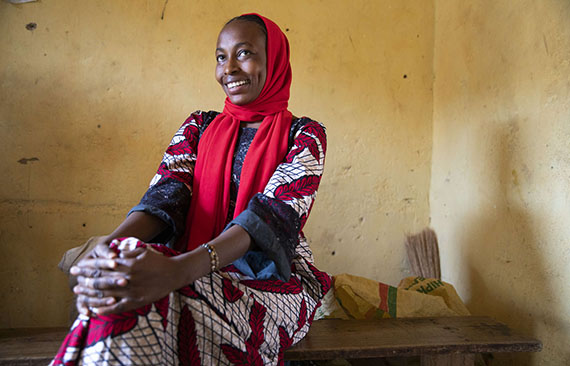Dear friend,
Across the world, communities yearn for peace and security. In northern Nigeria, disputes, conflicts, and violence have been escalating due to the effects of climate change and a lack of government authority.
Farmers and herders often argue about growing their crops and managing flocks of animals on less grazable land. Many women feel unsafe in their communities to fulfill their basic needs. And law enforcement is often unable to reach remote rural areas to help keep the peace. To meet these challenges, Mercy Corps implements negotiation and mediation training for local leaders in order to resolve disputes.
Learn more about how our approach to peacebuilding through mediation — and how you might apply some of these solutions to negotiations in your own life.

Habiba, who has seen the detrimental effects of violence in her community in Nigeria, has been working with Mercy Corps to implement extensive training on conflict resolution, tolerance, and peacebuilding. She feels a sense of internal peace and is happy that she can bring her community together peacefully.
In our peacebuilding work, Mercy Corps has adopted the Interest-Based Negotiation and Mediation (IBNM) training. The theory posits that if people negotiate from their positions — "I want the whole orange," for example — it becomes a zero-sum game. By negotiating from interests — why people want the orange — parties can get what they want, which results in more opportunities for win-win solutions.
Here are three ways Mercy Corps is using these meditation tactics to help reduce violence in Nigeria and beyond:
 |
 |
 |
Improving mediation capabilities of local leaders: Local leaders who receive the training feel they have stronger conflict resolution skills, perceive fewer violent events, and feel a greater sense of security in their communities. In one study, the percentage of participants who reported experiencing a violent incident fell from 55% to 29% after local leaders completed mediation training. |
| |
 |
 |
Combine interventions that stop violence with those that build trust: Mercy Corps has found that implementing programs that stop violence isn’t enough because there are underlying causes of conflict, such as structural, social, and institutional inequities. Therefore, we’ve been implementing mediation practices that focus on social cohesion. |
| |
 |
 |
Gradual implementation of peacebuilding intervention: Knowing that achieving peace doesn’t happen overnight, Mercy Corps has been implementing work plan sequences for long-term impact. Rather than conducting all meditation training at once, Mercy Corps hosts training that addresses stopping violence and later hosts training that improves social cohesion and builds trust. |
 |
Throughout our work in Nigeria, we’ve found that mediation training is a key component that can have meaningful outcomes for conflict resolution and peacebuilding worldwide. Learn more about how we put these mediation approaches into practice — and how you might implement them in your own life.
Yours in peace and security,
— The Mercy Corps team
|

